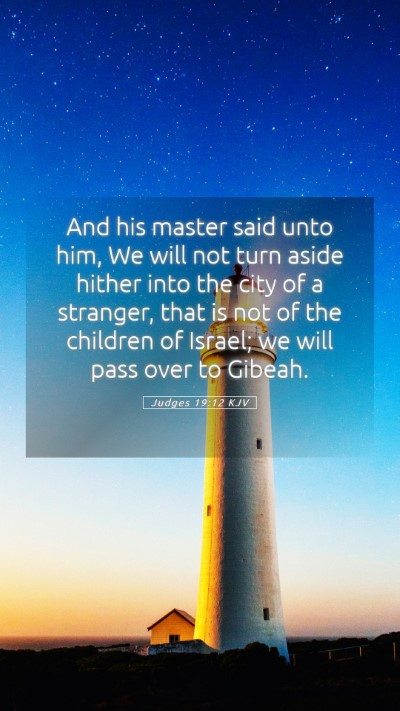Understanding Judges 19:12 - A Comprehensive Bible Verse Explanation
Judges 19:12 reads: "And his master said unto him, We will not turn aside hither into the city of a stranger, that is not of the children of Israel; but we will pass over to Gibeah." This verse occurs during a critical moment in the narrative of the Levite and his concubine, highlighting themes of hospitality, safety, and cultural identity.
Bible Verse Meanings and Interpretations
-
Cultural Context:
Matthew Henry emphasizes the importance of the stranger’s city, noting that it signifies a place where the Levite could not expect the hospitality expected among Israelites. The Levite’s decision to avoid the city of strangers indicates a strong cultural identity and the preference for safety and known societal norms.
-
Practical Application:
Albert Barnes elaborates on the notion of hospitality in Israelite culture, juxtaposing it with the Levite’s reluctance to turn to a non-Israelite community. His hesitation underscores the deeper truth about the Israelites' perception of outsiders and foreshadows the ensuing violence and turmoil in Gibeah.
-
Ethical Reflections:
Adam Clarke reflects on the ethical implications of the Levite’s journey. The decision to seek safety within their own community raises questions about the responsibility of one’s own people to provide for those in need, an important aspect of biblical teaching on community and care for strangers.
In-Depth Bible Verse Analysis
The Levite's journey to Gibeah, as highlighted in Judges 19:12, is laden with significance beyond the immediate narrative. By choosing to bypass the unnamed city and seeking refuge in Gibeah—an Israelite town—he acknowledges the inherent risks involved in traveling through foreign territories during a time when hospitality was paramount for traveler safety.
- Significance of Cultural Identity:
The reluctance to enter a city of strangers reflects a covenant community's loyalty and a sense of belonging, reiterating the biblical emphasis on caring for one's own.
- Word Analysis:
Understanding the Hebrew terms used in this passage lends further insight into the atmosphere of mistrust that existed during this period in Israel, providing a richer context for its interpretation.
- Symbolism of Gibeah:
Gibeah itself becomes a symbol of the trials of Israel during the Judges period—a glimpse into the moral and societal decay that beckons further inquiry into the responsibilities of society to its members and to outsiders.
Connecting Judges 19:12 with Other Scriptures
- Genesis 19:1-3 - The incident at Sodom emphasizes the dangers faced by strangers.
- Luke 10:34-35 - The Good Samaritan parable contrasts the treatment of travelers by different cultures.
- Matthew 25:35 - “For I was hungry and you gave me something to eat, I was thirsty and you gave me something to drink…” underlining the call to hospitality.
Application of the Verse to Daily Life
Applying the lessons from Judges 19:12 to contemporary life invites crucial reflections on how we view and treat others, especially those who are different from us. Similar to the Levite, we may have a natural tendency to seek comfort among our own people; however, there's a biblical call to extend hospitality and kindness across cultural divides.
Conclusion
Judges 19:12 serves as a poignant reminder about the complexities of human relationships, hospitality, and moral choices in a fractured world. The insights from public domain commentaries like those of Henry, Barnes, and Clarke enrich our understanding of this passage, allowing us to engage deeply with its meanings and implications for our lives today.
Whether you're part of bible study groups or engaging in online bible study, the exploration of such scriptures offers profound bible study insights and helps us in understanding Scripture more fully.


